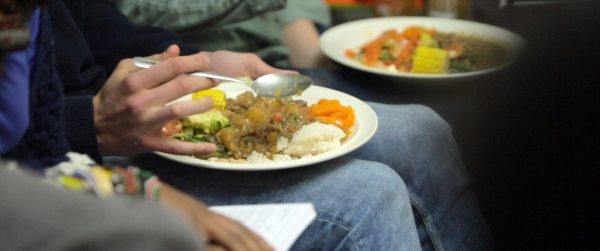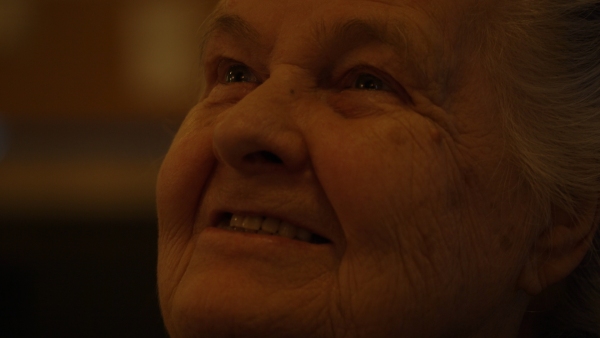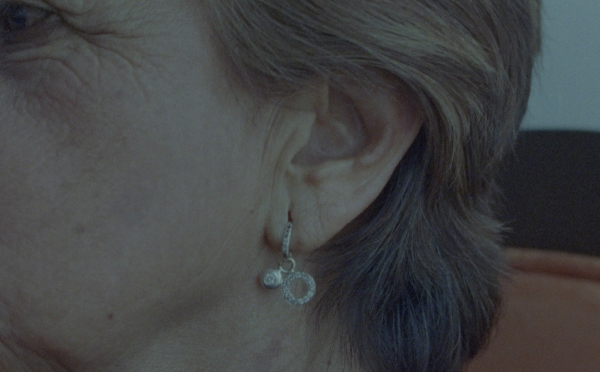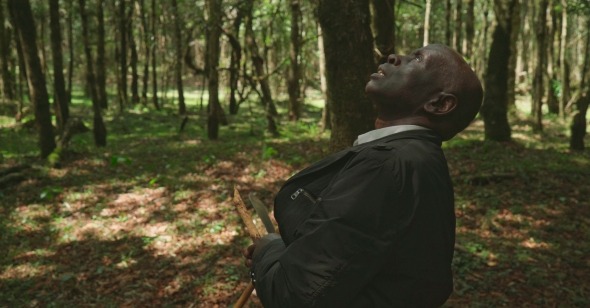Better Together
Emma Piper-Burket on Four Stories: New Nonfiction Shorts
Four Stories: New Nonfiction Shorts was a shorts program scheduled to run at this year’s First Look Festival at Museum of the Moving Image on March 14, 2020. The lineup included: Derek Howard's The Harvesters—pictured above—which zeroes in on three Maasai men harvesting wild honey in the forests of Kenya, methodically and objectively documenting a process that has likely been carried out unchanged for generations; If We Say That We Are Friends, by Yaara Sumeruk, tackling the complicated legacy of apartheid in South Africa in vérité style through the story of a group of activists who invite wealthy, white Cape Town suburbanites to the townships for a meal and dialogue through their Dine with Khayelitsha supper club; When Two or Three, in which Carmine Grimaldi uses a close camera lens and visceral movement to share space and time with a pastor and his wife in the lonely company town of Bagdad Arizona; and Lina Rodriguez’s Aquí y allá, exploring the passages of time and memory in Chipaque, Colombia—where her family is from—in an intergenerational collage of audio, 16mm, and miniDV footage.
On the surface, the four films are vastly different in both subject matter and approach, yet an unexpected sense of unity forms when they are viewed together. The festival was officially canceled the day prior to the screening, so the films have not yet been shown as a program as intended. We will never know what associations and connections may have arisen out of the screening that weekend (Howard, Sumeruk, and Grimaldi were all scheduled to attend). In the days and weeks after, as the world went into quarantine, I had separate conversations over the phone with each of the four filmmakers, as well as with Eric Hynes, the festival’s programmer.
What emerged from these calls was a surprising commonality of practice and process. Below are excerpts of these conversations, focusing less on the films themselves than on the creative process that brought each of them into being. I've arranged the excerpts into a sort of rough dialogue, so that although we could not all meet in the same room, we can still try and catch a glimpse of the ideas that may have emerged.
 If We Say That We Are Friends
If We Say That We Are Friends
Reverse Shot: I wonder if you can talk about your creative process: what are the steps—or are there steps—you go through for every project? Is there a process that's sort of standard or does it adapt to each project?
Derek Howard: I like to look at things almost through a mythic lens, how stories repeat themselves. I think that all the stories we hear or all the films we see are similar stories just retold in different ways. I'm always trying to contextualize things within a historical or anthropological or mythological context. I love the idea of genealogy stories: like where does the history of this come from? I love taking everyday characters and then trying to create this mythological context around them.
Yaara Sumeruk: I'm interested in how you make things that are invisible visible in the world, and then maybe because I'm interested in that theme this translates into the process of how I make the films. What I'm learning is the importance of creating from an emotion instead of creating to get to an emotion. I made this film from a deep emotion and desire to connect and share. I think it's important that you stay close to the meaning of what you first intended to do, and that's a really good guide.
Lina Rodriguez: I think for me the process of filmmaking is about that process of discovery, the process of not knowing, which I don't think is that different from life, we just have different mechanisms to give ourselves answers in life. For me, making something when I know exactly what it is and why I'm doing it and I'm just illustrating this answer—I’m just not that interested in pursuing that, so... I guess the long, winded road of not knowing and exploring and also just encountering others in terms of process is about trying to open up spaces. It's not just about what I see behind the camera, because I see my job being behind the camera, but also around the camera.
Carmine Grimaldi: I often am interested in the way a piece can emerge organically, not necessarily in conversation or not necessarily in explicit dialogue, but in a conversation of various registers, whether its intuitive or choreographed and the way that a style of the film can emerge in that organic conversation. For me it’s the reason I’m interested in nonfiction film, whatever register you want to call that—documentary or something else—the reason I'm compelled by filming people in a largely non-scripted way is precisely that it's unpredictable and that I can't control it.
Eric Hynes: And that is just how First Look is, I don't like the idea of there being these categories, narrative or documentary. It often leads us there—that space of ‘let’s not call this a documentary festival, let's not call this a narrative and documentary festival.’ Our ethos is: what is a valuable piece that sticks with us and that feels like our audience isn't going to get to see otherwise? Putting films together like this is as much about putting filmmakers together because you want to have their work bounce off one another and you want to see what comes out of it. Like everything else in the festival it's sort of like an experiment—what will happen if these four films play together and as many of the filmmakers who could be present are present? What emerges?
 When Two or Three
When Two or Three
YS: I’m very drawn to process, like, “How?” As a little kid I would just watch people build things, paint things. If people were going through a process of anything, I wanted to bear witness to it and I find that it is still something I'm very interested in. There's a process in the film, like you see them getting ready for the dinners and doing the dinners, but the dinner doesn't just come because they need to commune, the dinner exists because of a history. And I think there’s something to that. The process began so long before what we're seeing. So where does it begin and where does it end? I'm drawn to these things that unify us without us being aware of it.
DH: I've never been a pure documentary person that thinks it’s evidence and it’s truth. I don’t really think we need truth, but we need films to emote and to reflect our feelings and be truthful on an emotional level. But I don't think it's about facts and issues...
LR: When you're in film school you have all these parameters of what to do and how to make film and how you should know what you're doing before you embark on the adventure of making a film. But once I started making films with a Super 8mm camera, I started using it as a way to capture and shoot things that interested me without the intention of making something. So I continued to make films in that way, and then I made my feature films, which also have a process of discovery, but sometimes they have scripts and I work with actors. So although I have these two different ways of making films, I guess the thing that joins them is this interest in using filmmaking as a path of discovery and encountering other people and trying to learn from each other and not imposing something that I already know.
CG: To come to a project with too much intention, beyond the intention of absorbing and understanding, and playing with and sharing with and learning from, I think is too restrictive for me, I don't think I can bring that much, and so I think it needs to be largely unplanned and improvisatory and based on building a relationship that is generous and exploratory.
EH: I’m often asked what I look for as a programmer, what am I drawn to? And it's exactly that. It is something that is discovering itself as it’s playing, that's what I’m most drawn to. What I get most excited about, and what I feel a sense of urgency around participating as a programmer, is the work that gives the feeling of figuring itself out as it goes along. Sometimes that’s about the process of it, some of which makes its way onto the screen, sometimes it doesn’t, but even if it doesn't make it onto the screen overtly I feel like it’s in the DNA and you can just feel it. Here’s something where what you see is not necessarily what was planned directly and it's better for it, because its discovering itself so therefore you, as the viewer, are allowed to discover something too. You’re not being told something, something’s not being demonstrated to you, you are having an experience, and something is emerging in front of you. That's just the best. If there’s a single reason why I'm drawn to cinema, it’s that.
 Aquí y allá
Aquí y allá
